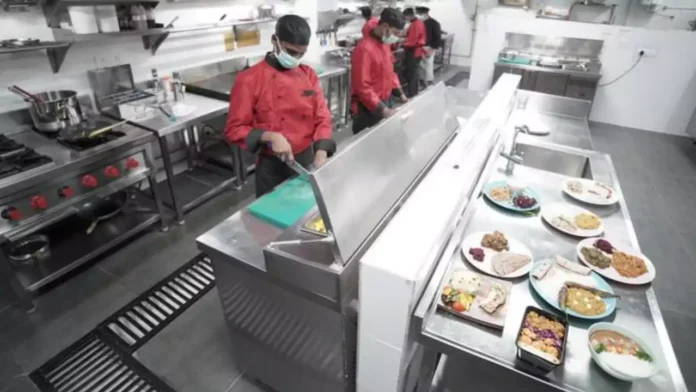Continued inflation and a decrease in funding for startups might pose challenges for the cloud kitchen segment in India, making it difficult to maintain the pace of revenue growth seen in the past.
The earnings reports of the first two quarters for listed restaurant and food companies indicate a broader trend of sluggish growth amid macroeconomic headwinds.
In the fiscal year 2023, Rebel Foods, backed by Peak XV Partners and Coatue, reported a notable 40% year-over-year growth in revenue. Simultaneously, Curefoods, supported by Accel, witnessed a quadruple increase. Similarly, Biryani by Kilo, with backing from Alpha Wave, experienced a doubling of its revenue.
Continue Exploring: Rebel Foods surpasses INR 1,000 Cr operating revenue milestone, reports 39% YoY growth in FY23
Listed restaurant chains like Jubilant Foodworks, Restaurant Brands Asia, Westlife Development, Devyani International, Sapphire Foods, and Barbeque Nation experienced year-over-year topline growth of 17-48% in the previous fiscal year. However, this growth narrowed to 6-22% in the first half of FY24, with Barbeque Nation reporting flat revenue growth during the April-September period.
Ankush Grover, CEO and co-founder for India and MENA regions at Rebel Foods, stated that the multi-brand company is experiencing a consistent year-over-year growth of 15-20% for its key brands such as Behrouz Biryani and Oven Story.
Ankit Nagori, the founder of Curefoods, emphasized that companies are prioritizing sustainable growth. Curefoods anticipates achieving a revenue of INR 800 crore by the end of FY24, reflecting a growth of over 100% from FY23.
“Inflation as well as interest rate increases are hampering the overall size of the consumer plate,” Nagori said. “For us, the food costs have gone up, and for customers the wallet sizes have shrunk. In general, disposable incomes are lower than the last 18 months, and I’m hoping it will correct in the next few months.”
Continue Exploring: Curefoods records fourfold increase in operating revenue, reaching INR 382 Crore in FY23, but faces widening losses
Rebel Foods manages various brands like Faasos, Oven Story, and Behrouz Biryani. Curefoods oversees a range of cloud kitchen brands, including EatFit, CakeZone, Nomad Pizza, Sharief Bhai, and Frozen Bottle.
While Jubilant Foodworks holds the master franchise for Domino’s Pizza, Dunkin Donuts, and Popeye’s in India, Westlife Development operates McDonald’s restaurants in the southern and western regions of the country. As for Burger King, its master franchisee in India is Restaurant Brands Asia.
Devyani International manages Yum! Brands restaurants like Pizza Hut and KFC across 14 regions, including Karnataka, Telangana, Andhra Pradesh, and West Bengal. Meanwhile, Sapphire Foods oversees Pizza Hut and KFC outlets in 10 regions, encompassing Maharashtra, Delhi, Haryana, and Gujarat. Speciality Restaurants handles establishments such as Oh! Calcutta and Mainland China.
“There’s no doubt that more Indians are eating out…that’s in tandem with the growing young population, especially in urban areas with a demography of working professionals who don’t choose to cook at home,” a Mumbai-based consumer sector analyst said. “This is the cohort that will drive growth, because for these customers, eating out is not necessarily a discretionary spend.”
However, at present, the larger brands appear to be encountering a deceleration in their growth. According to industry experts, the price hikes implemented by restaurant chains and eateries in the past 12-15 months to address escalating food inflation may have reached their maximum elasticity.
Moreover, the rise of alternative choices like local chains or smaller brands may pose a challenge to their larger counterparts in competing for a slice of the market.
“On the pretext of inflation, a lot of restaurants, including cloud kitchen brands, started increasing their prices. While initially it worked out, there’s a tipping point to how much you can increase without impacting the demand,” explained Arvind Singhal, Chairman of Gurgaon-based consumer retail-focused consultancy firm Technopak. “The same thing is happening in the FMCG industry, where the story of premiumisation has been overplayed.”
He said, “The other factor is for every segment within the restaurant sector, there are more options available to the customer. Overall, the food and beverage sector is not suffering…simply because so much is starting to come from smaller players.”
According to Singhal, there has been a notable surge in the number of small eateries and restaurants after the Covid-19 pandemic.
As of September 30, 2023, Zomato, the food-delivery company, reported having 238,000 restaurant partners on its platform, compared to 207,000 the previous year and 173,000 as of the end of September 2021. This number includes both existing restaurants onboarded by Zomato and serves as a partial proxy for new eateries emerging on the platform.
Continue Exploring: Zomato’s bull run continues as Goldman Sachs and Jefferies raise price targets post HSBC’s lead
Curefoods’ Nagori said, “Last two-three years, there were a lot of tailwinds in the cloud kitchen business including the change in consumer behaviour. Funding in the sector also fuelled a lot of growth. Next few years are all about chasing profitability, while also looking at omnichannel–that’s the only way to grow in tier-II, tier-III markets.”





